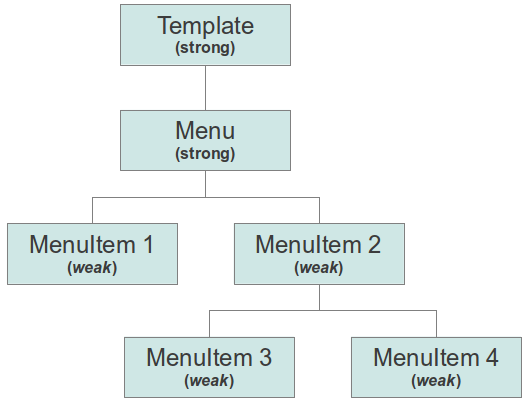Weak instances
What is a weak instance?
When developing with Mouf, you might end up creating a lot of instances. For instance, when developing a menu, you will have an instance for the menu, and an instance for each item of the menu.
Now, let's imagine you want to delete a menu. The menu, along the menu-items represent an instances grape. You would have to delete the menu instance, and each menuitem, manually. This makes the task long, tedious and error-prone.
This is where “weak” instances come into play. Weak instances can be automatically garbage-collected when no other instance references them. Using the menu example, the menu would be a “strong” object and the menu-items would be “weak” objects.

In this sample, we declared all MenuItems to be weak instances. Deleting the "Menu" instance will automatically destroy any "MenuItem" instance, because they would no more be connected to any "strong" instance. Also, deleting MenuItem 2 would automatically delete Menuitems 3 and 4.
However, deleting the "Template" instance will not delete the "Menu" instance. "Strong" instances are not garbage collected.
How do I declare a weak instance?
Currently, you cannot make an instance "weak" in the Mouf user interface. However, if you are a package developer, you can do it using the Mouf API:
// Make the "myInstance" a "weak" instance
$moufManager->setInstanceWeakness('myInstance', true);
Found a typo? Something is wrong in this documentation? Just fork and edit it!